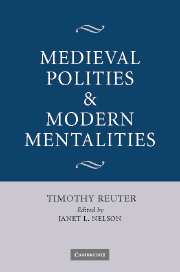Book contents
- Frontmatter
- Contents
- Editor's note
- Acknowledgements
- List of abbreviations
- Editor's introduction
- PART I MODERN MENTALITIES: HISTORIOGRAPHIES, METHODOLOGIES, PRECONCEPTIONS
- PART II THE SYMBOLIC LANGUAGE OF MEDIEVAL POLITICAL ACTION
- PART III POLITICAL STRUCTURES AND INTENTIONS
- 11 Assembly politics in western Europe from the eighth century to the twelfth
- 12 Sex, lies and oath-helpers: the trial of Queen Uota
- 13 Plunder and tribute in the Carolingian empire
- 14 The end of Carolingian military expansion
- 15 The Ottonians and Carolingian tradition
- 16 The making of England and Germany, 850–1050: points of comparison and difference
- 17 King, nobles, others: ‘base’ and ‘superstructure’ in the Ottonian period
- 18 The ‘imperial church system’ of the Ottonian and Salian rulers: a reconsideration
- 19 Peace-breaking, feud, rebellion, resistance: violence and peace in the politics of the Salian era
- 20 The medieval German Sonderweg? The empire and its rulers in the high Middle Ages
- 21 Mandate, privilege, court judgement: techniques of rulership in the age of Frederick Barbarossa
- 22 All quiet except on the Western Front? The emergence of pre-modern forms of statehood in the central Middle Ages
- Index
13 - Plunder and tribute in the Carolingian empire
Published online by Cambridge University Press: 12 August 2009
- Frontmatter
- Contents
- Editor's note
- Acknowledgements
- List of abbreviations
- Editor's introduction
- PART I MODERN MENTALITIES: HISTORIOGRAPHIES, METHODOLOGIES, PRECONCEPTIONS
- PART II THE SYMBOLIC LANGUAGE OF MEDIEVAL POLITICAL ACTION
- PART III POLITICAL STRUCTURES AND INTENTIONS
- 11 Assembly politics in western Europe from the eighth century to the twelfth
- 12 Sex, lies and oath-helpers: the trial of Queen Uota
- 13 Plunder and tribute in the Carolingian empire
- 14 The end of Carolingian military expansion
- 15 The Ottonians and Carolingian tradition
- 16 The making of England and Germany, 850–1050: points of comparison and difference
- 17 King, nobles, others: ‘base’ and ‘superstructure’ in the Ottonian period
- 18 The ‘imperial church system’ of the Ottonian and Salian rulers: a reconsideration
- 19 Peace-breaking, feud, rebellion, resistance: violence and peace in the politics of the Salian era
- 20 The medieval German Sonderweg? The empire and its rulers in the high Middle Ages
- 21 Mandate, privilege, court judgement: techniques of rulership in the age of Frederick Barbarossa
- 22 All quiet except on the Western Front? The emergence of pre-modern forms of statehood in the central Middle Ages
- Index
Summary
In 882 the Emperor Charles III was forced to break off his siege of the Norsemen's camp at Asselt and make peace with them. One of their leaders, Gottfried, got a Carolingian wife and the benefices in Frisia formerly held by Rorich; the other, Siegfried, got a large sum in gold and silver. Commenting on these events, the Mainz cleric who composed this section of the Annals of Fulda wrote:
and what was still more of a crime, he did not blush to pay tribute, against the custom of his ancestors, the kings of the Franks, and following the advice of evil men, to a man from whom he ought to have exacted tribute and hostages.
This is undoubtedly polemic in intention, but the accusation is not, or not directly, that Charles III should have fought the Northmen, but that he should have taken tribute and hostages from them like a proper Frankish king. In saying this, the annalist was following a long tradition; earlier writers liked to demonstrate the power of the kings they wrote about by listing the tribute they took. For the Merovingian period we know of tribute-payments by the Lombards, the Bretons, the Thuringians, the Saxons, the Frisians and the Basques, as well as by other smaller German tribes. Such payments could be made in gold and silver, or in kind. The Lombards had to pay 12,000 solidi annually; these solidi predate the Carolingian monetary reform, which makes the sum a very large one indeed.
- Type
- Chapter
- Information
- Medieval Polities and Modern Mentalities , pp. 231 - 250Publisher: Cambridge University PressPrint publication year: 2006
- 1
- Cited by



